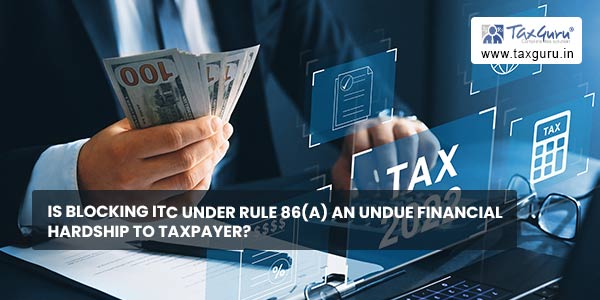Taxpayers throughout the country are receiving multiple notices which pertain to blocking of input tax credit (‘ITC’) invoking Rule 86(A) of the Central Goods and Services Tax Rules, 2017 (‘CGST, Rules 2017’). From the email received, no reason to invoke Rule 86A of CGST Rules, 2017 is specified. Whereas notice should be stated that department should have reason to believe that a fraudulent or in eligible ITC has been availed.
In many instances notices are also not received by the taxpayers and the fact only comes to notice when one goes to file the return and it is seen that the input tax credits are blocked. It is submitted that it is purely an undue financial hardship to the tax payer when taxpayer is going to deposit his output tax liability. It is more advisable that in genuine cases, the same could be asked by means of a notice under any section of assessment tax liability rather than blocking ITC, in this situation there will be no hardship to the tax payer to discharge their current output tax liability.
Furthermore, just to a prime facie mismatch of ITC availed in GSTR 3B and ITC available in GSTR 2A, ITC has been blocked. It is submitted that only in case of a fraudulent or in eligible ITC has been availed, then step of blocking of an input tax credit may be taken. Further, in case of mismatch of ITC availed in GSTR 3B and ITC available in GSTR 2A, ITC should be blocked in exceptional circumstances like when the supplier is missing, the supplier has closed down his business or the supplier found to be non-existent or bankrupt.

Across multiple High Courts, this Rule 86(A) and these notices are being contested. The Hon’ble High Courts is observing that Department should at least provide the reason for blocking the input tax credit and it should be specified in a notice under rule 86(A). Moreover, the rule itself has a provision stating that the department should have a reason to believe that there is an input tax credit that was availed fraudulently or there is an ineligible input tax credit that has been availed by the taxpayers before taking the step of blocking of an input tax credit.
The High Court has directed that department cannot approach the recipient directly and ask them to reverse the input tax credit. The credit availed in case of GSTR 2A and GSTR 3B match can be reversed only in exceptional circumstances like when the supplier is missing, the supplier has closed down his business or the supplier found to be non-existent or bankrupt.
Moreover, press release of 27th GST Council Meeting dated 4th May 2018 clearly mentioned that “(iv) No automatic reversal of credit: There shall not be any automatic reversal of input tax credit from buyer on non-payment of tax by the seller. In case of default in payment of tax by the seller, recovery shall be made from the seller however reversal of credit from buyer shall also be an option available with the revenue authorities to address exceptional situations like missing dealer, closure of business by supplier or supplier not having adequate assets etc.”
Further, the High Court has taken the view that in case the debit entries are made by the proper Officer, the same would tantamount to permanent recovery of the input tax credit and the permanent recovery is governed by the statutory provisions (Sections 73 or 74 respectively of the CGST Act as the case may be) and it would certainly travels beyond the plain language and the underlined intent of Rule 86A.
Moreover, the Govt of Kerala wide Circular 4/2021 has laid down a standard operating procedure for blocking input tax credit. The important points in the circular with the SOP for blocking of input tax credit are
1. That the taxpayers should be intimated before blocking the input tax credit and without intimation, the ITC cannot be blocked by the department.
2. That in case the taxpayer represents against the blocking of the input tax credit, then within15 days, such representations have to be disposed of by the department.
3. Lastly, the blocking of input tax credit should be used as an emergency provision only and should not be used as an alternative for issuing show-cause notices and assessing the case.
In the above SOP, it is also mentioned that blocking of input tax credit under Section 86A is an emergency measure to prevent the taxpayer from using the credit availed fraudulently or ineligible credit taken. Hence nothing prevents the proper officer from taking any other suitable actions under any other provisions of GST laws including determination of tax under section 73 or 74, demand and recovery, provisional attachment of property etc.
ITC blocking is a temporary step and should not be seen as equivalent to recovery of tax. action under section 73 and 74 is full and final demand creation exercise as per GST Law. Both are mutually expulsive and show cause notice under section 73 and74 should be issued immediately upon completion of investigation in all cases.
*****
Disclaimer: Nothing contained in this document is to be construed as a legal opinion or view of either of the author whatsoever and the content is to be used strictly for informational and educational purposes. While due care has been taken in preparing this article, certain mistakes and omissions may creep in. the author does not accept any liability for any loss or damage of any kind arising out of any inaccurate or incomplete information in this document nor for any actions taken in reliance thereon.





